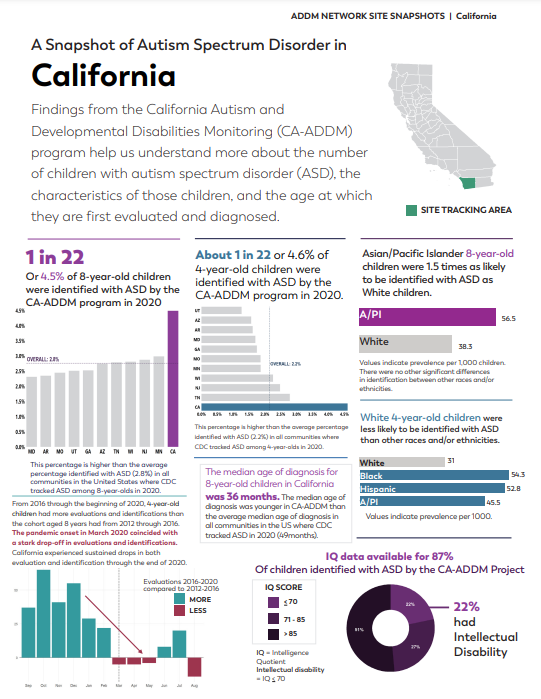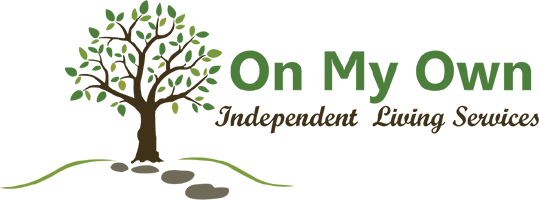Autism Spectrum Disorder (ASD)
AUTISM DEFINITION & CHARACTERISTICS
Autism spectrum disorder (ASD) is a neurological and developmental disorder that affects how people interact with others, communicate, learn, and behave. Although Autism can be diagnosed at any age, it is described as a “developmental disorder” because symptoms generally appear in the first two years of life. Autism is known as a “spectrum” disorder because there is wide variation in the type and severity of symptoms individuals experience.
According to the Diagnostic and Statistical Manual of Mental Disorders (DSM-5), a guide created by the American Psychiatric Association that health care providers use to diagnose mental disorders, people with ASD often have:
- Difficulty with communication and interaction with other people
- Restricted interests and repetitive behaviors
- Symptoms that affect their ability to function in school, work, and other areas of life
National Institute of Mental Health. Autism Spectrum Disorder. 2022. https://www.nimh.nih.gov/health/publications/autism-spectrum-disorder
ON MY OWN'S RESPONSE
On My Own provides services to individuals with many types of disabilities. In California, the rates of autism have grown substantially (see statistics below). At OMO we are seeing a rise in the number of adults we serve with Autism. The leadership of OMO is committed to maintaining knowledge and building our capacity in areas of Autism Spectrum Disorder. In 2023, over 20 of our managers, leaders and front-line staff will be Autism Certified through IBCCES (International Board of Credentialing and Continuing Education Standards). Our organization is developing an Autism Task Force comprised of all ASD clients. These clients meet with the CEO to discuss autism related topics, issues, and seek their input on many aspects of our services. For more information about Autism or to share any helpful resources, please contact us!
U.S. & CALIFORNIA DATA ON AUTISM
According to the CA-ADDM (Autism and Developmental Disabilities Monitoring) Network, about 1 in 22 or 4.5% of 8-year-old children were identified with Autism in 2020 (based on tracking within 11 communities in the U.S.).

Centers for Disease Control and Prevention. Autism and Developmental Disabilities (ADDM) Network. Community Report on Autism 2023. Page 12. https://www.cdc.gov/ncbddd/autism/pdf/ADDM-Community-Report-SY2020-h.pdf
Also in this study, 1 in 22 or 4.6% of 4-year-old children were identified to have Autism in 2020. This percentage is higher than the average percentage (2.2%) across multiple states.

Centers for Disease Control and Prevention. Autism and Developmental Disabilities (ADDM) Network. Community Report on Autism 2023. Page 32. https://www.cdc.gov/ncbddd/autism/pdf/ADDM-Community-Report-SY2020-h.pdf
UC Davis M.I.N.D. Institute scientists analyzed new diagnosis rates of autism in California based on the Department of Developmental Services (DDS) data and all California births. They compared children born from 1990 to 2002, in which they confirmed a 600% rise in autism diagnoses. Given that it has been over 20 years later, DDS data for California points to a consistent and increasing surge of autism.

Autism Society San Francisco Bay Area. Autism in California 2020: A Report to the Public. Page 2-3. https://sfautismsociety.org/wp-content/uploads/2021/11/Autism-in-California-2020-A-Report-to-the-Public.pdf



AUTISM RESOURCES
- Autism Wandering Awareness Alerts Response Education (AWAARE)
- Autism Speaks
- Autism Society of America
- Autism Speaks Dental Guide and Video
- Autistic Self Advocacy Network
- Families for Early Autism Treatment (FEAT)
- First Signs
- M.I.N.D. Institute
- National Institutes of Mental Health: Autism Spectrum Disorder
- Life Journey through Autism Series (Organization for Autism Research)
- Operation Autism for Military Families
- Teach
- National Foundation for Autism Research
- National Center for Autism
- Autism Awareness Centre
- California Autism Professional Training & Information Network
- CDC Learn the Signs Act Early
- Career Assistance for People with Autism
- National Center for Autism
